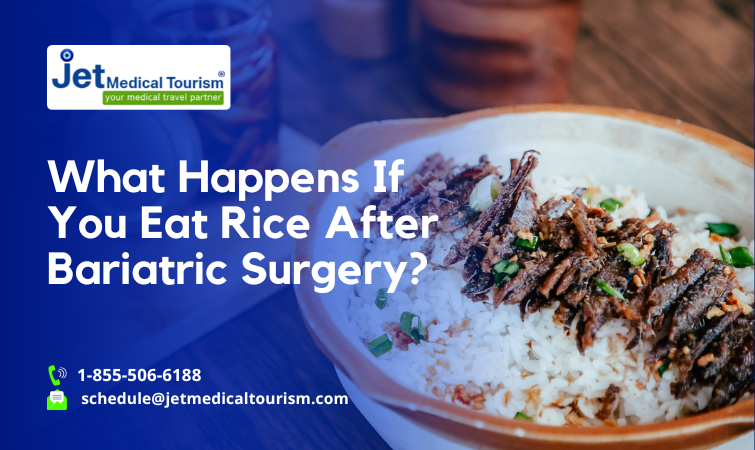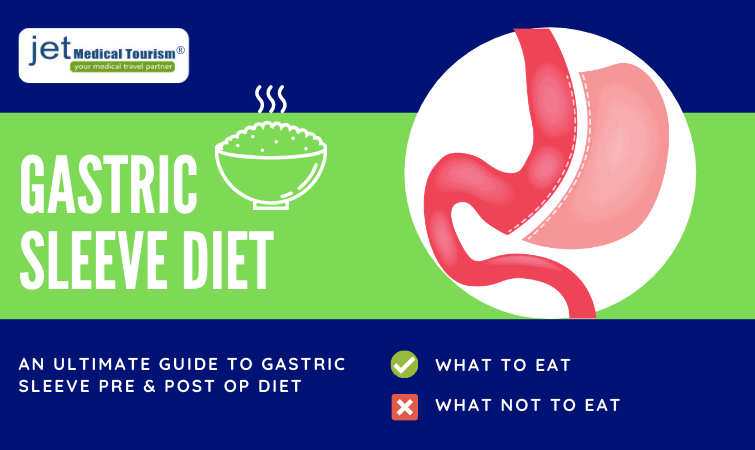What Happens If You Eat Rice After Bariatric Surgery?
Bariatric surgery—whether it’s gastric sleeve, gastric bypass, or another weight loss procedure—offers life-changing health benefits. But the journey doesn’t stop after surgery. What you eat post-operation plays a critical role in your recovery, weight loss success, and long-term health. A common question patients ask is:
Can I eat rice after bariatric surgery?
In this blog, we’ll dive deep into when and how rice can be reintroduced to your diet after gastric sleeve or gastric bypass surgery, why it’s not part of the early stages, and how to enjoy it safely when the time is right.
Why Diet Matters After Bariatric Surgery
Bariatric surgery significantly changes your digestive system. Procedures like the gastric sleeve reduce the stomach’s size by about 75%, while gastric bypass reroutes your digestive tract to reduce calorie absorption. These changes demand a totally new approach to eating.
You must follow a staged dietary progression, which helps:
- Promote healing of the stomach and intestines
- Prevent complications like dumping syndrome, nausea, or vomiting
- Ensure nutrient absorption despite a smaller stomach
- Gradually reintroduce your digestive system to different food textures
Each stage of your post-op diet is critical. Let’s understand where rice fits into this picture.
Can I Eat Rice During the Pureed Stage of Bariatric Surgery?
Short answer? No.
Rice is not allowed during the pureed stage (usually Weeks 2–4 post-op). During this phase, your stomach is still healing and extremely sensitive. Foods must be soft, smooth, and easy to digest without chewing.
Why is rice off-limits during this phase?
- Texture: Even well-cooked rice is not soft enough to qualify as “pureed.”
- Digestibility: Rice expands in your stomach and may block the new, narrow opening between the stomach and small intestine.
- Low Protein, High Carb: At this stage, protein is your top priority—not starchy carbs like rice.
If you eat rice during this stage, it can cause bloating, nausea, pain, or even vomiting.
A 2023 study by MDPI found that rice, pasta, bread, and fibrous vegetables were among the most commonly reported food intolerances after bariatric surgery, particularly in the first 6 months post-op.
What Happens If You Eat Rice Too Soon After Bariatric Surgery?
Eating rice too early in your post-op journey — especially during the liquid or pureed food phases — can lead to serious complications. Here’s why it’s important to wait:
Potential Risks of Eating Rice Too Early:
- Bloating & Gas: Rice can swell in your pouch or altered stomach, causing painful pressure or bloating.
- Nausea or Vomiting: The starchy, bulky texture can trigger discomfort or vomiting, especially if not chewed thoroughly.
- Dumping Syndrome (especially after gastric bypass): Eating rice too soon — particularly in large portions or with sugar/fat — may cause rapid emptying of food into the small intestine. Symptoms include dizziness, nausea, cramps, and fatigue.
- Food Blockage: Undigested rice clumps can block your narrow gastric outlet, potentially requiring medical attention.
- Nutritional Setback: If rice displaces protein or vegetables early on, it can delay healing and lead to poor nutrient absorption.
When Can You Eat Rice After Bariatric Surgery?
The timeline varies based on your recovery and your surgeon’s guidelines, but here’s a general idea:
Weeks 1–4: Liquid & Pureed Foods
- Focus on hydration, broth, protein shakes, and pureed meats or veggies.
- Rice is NOT allowed.
Weeks 5–8: Soft Foods Stage
- You can begin adding scrambled eggs, soft-cooked veggies, and lean ground meats.
- Still, avoid rice—especially sticky, dry, or fibrous types like brown rice.
Week 8 and Beyond: Reintroducing Solid Foods
- If you’re healing well and tolerating soft foods, you may begin to reintroduce small amounts of solid foods like rice.
⚠️ Some bariatric programs recommend waiting until 10 to 12 weeks post-op before trying rice—especially after gastric bypass surgery.
Always consult your bariatric team before making changes to your meal plan.
READ:
Why Is Rice Introduced Later?
Even though rice is a common and culturally significant food for many, it’s one of the more difficult foods to digest after bariatric surgery.
Here’s why rice is delayed:
- Starch Expansion: Rice expands when mixed with fluids, which can overfill your small stomach pouch and cause pain or nausea.
- Dry Texture: Dry or sticky rice can clump together and get “stuck,” especially in the narrower gastrointestinal tract post-surgery.
- Takes Up Space: Rice is a carbohydrate, which fills you up quickly, leaving less room for protein and essential nutrients.
These issues are especially common when it comes to rice after gastric bypass—since this procedure involves both stomach size reduction and intestinal rerouting, making digestion more sensitive.
How to Safely Eat Rice After Bariatric Surgery
When your surgeon gives the green light, you can eat rice after bariatric surgery—but there are some best practices to follow for a safe and comfortable experience:
1. Start with Tiny Portions
Begin with 1–2 tablespoons of well-cooked rice and see how your body reacts.
2. Chew Thoroughly
Rice should be chewed to a paste-like consistency. Swallowing poorly chewed rice can lead to discomfort or even blockage.
3. Choose White Rice Over Brown (Initially)
White rice is softer, lower in fiber, and easier to digest.
Brown rice, while healthier in terms of fiber, can be too rough on your healing stomach and may cause bloating.
4. Go for Moist, Non-Sticky Varieties
Avoid sticky rice or overly dry pilafs. Try:
- Sushi rice
- Boiled jasmine or basmati rice
- Congee (rice porridge) – especially helpful during the transition phase
5. Pair Rice with Protein and Veggies
Rice alone is not a complete meal. Combine it with:
- Grilled fish or chicken
- Soft-cooked vegetables
- Legumes (if tolerated)
Protein always comes first in a post-bariatric diet—rice should only be added once you’ve met your protein needs.
6. Eat Slowly
Meals should take 20–30 minutes to complete. Eating too fast increases your risk of dumping syndrome, bloating, or vomiting.
Alternatives to Rice During the Early Recovery Phase
If you’re missing rice, don’t worry. There are some easier-to-digest, bariatric-friendly substitutes you can enjoy earlier:
Cauliflower Rice
- Low-carb
- Soft texture
- Easy to season and cook
- Great for early soft food stages
Mashed Sweet Potatoes
- Rich in vitamins
- Naturally soft and easy to digest
- Can be eaten in the pureed or soft food stage
Quinoa
- High in protein and fiber
- Softer than brown rice when cooked
- Best introduced after the soft food phase
These options help you enjoy a starchy texture without the risks associated with traditional rice too soon after surgery.
Rice After Gastric Sleeve vs. Rice After Gastric Bypass: Any Differences?
While the general rules are the same, the type of bariatric surgery may influence how soon or how well you tolerate rice.
Rice After Gastric Sleeve
Patients with gastric sleeve surgery often tolerate solid foods earlier than bypass patients, as their intestines remain intact.
Still, wait at least 8 weeks and follow your surgeon’s dietary plan.
Rice After Gastric Bypass
You might need to wait longer, as digestion is more significantly altered. The risk of dumping syndrome is higher, especially with white rice.
Tips for Long-Term Success with Rice and Your Bariatric Diet
Even once you reintroduce rice, remember:
- Protein is Priority #1
- Vegetables add fiber and nutrients
- Starchy carbs like rice should be limited
Additional Tips:
- Avoid sugary or fried rice dishes
- Do not eat and drink at the same time—wait 30 minutes after eating to drink water
- Stick to small plate philosophy: protein, veggies, then a small portion of rice
- Keep a food diary to track your tolerance
Final Thoughts: Can I Eat Rice After Bariatric Surgery?
Yes—you can eat rice after bariatric surgery, including both gastric sleeve and gastric bypass, but timing and portion control are crucial.
Eating rice too soon can lead to discomfort, blockages, or weight-loss setbacks. Follow your staged meal plan, start small, chew thoroughly, and listen to your body.
Before adding rice back to your diet, always consult your bariatric surgeon or dietitian. What works for one person may not work for another—and your long-term success depends on mindful, informed choices.
Thinking about bariatric surgery in Mexico?
At Jet Medical Tourism, we’ve helped thousands of patients from the U.S. and Canada achieve their health goals with affordable, safe, and effective bariatric surgery in Tijuana.

Contact us today to speak with a certified bariatric surgeon or start planning your weight loss journey!



